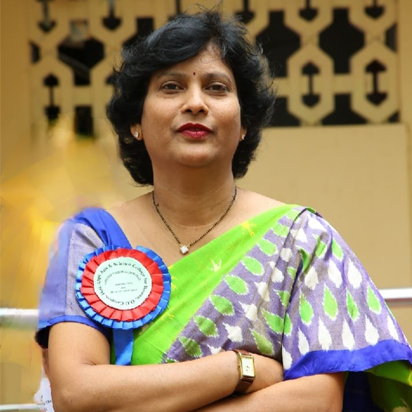About us
To provide education which is enriching, challenging and innovative to the deprived sections of the society with special emphasis on adolescent girls to join the main stream not as beneficiaries or recipients but as participants in societal growth .
Andhra Mahila Sabha Arts & Science College for Women began as an evening college in 1966, with the goal of providing higher education opportunities for working women and housewives in Hyderabad. The college started with 15 students in PUC and 5 students in B.A. courses. On 14th July 1968, the then Deputy Prime Minister of India, Shri Morarji Desai, officially inaugurated the institution. It was the first women’s college in the Osmania University region to introduce a B.Com course.
Today, the college offers a wide range of undergraduate programs including B.A., B.Sc., B.Com (General, Computer Applications, and Business Analytics), BBA, BBA (Healthcare Management), and B.Sc. (Honours in Computer Science). At the postgraduate level, it offers M.Com, M.Sc. (Mathematics with Computers and Organic Chemistry), and M.A. (Economics). With over 2,000 students enrolled, the college continues to grow in both size and academic offerings.
The college celebrated its Silver Jubilee in 1994, with dignitaries such as His Excellency Shri Krishna Kanth, then Governor of Andhra Pradesh, Prof. M. Malla Reddy, Vice-Chancellor of Osmania University, Mr. Justice A. Gangadhar Rao (Retd.), and Dr. Mrs. J. Geetha Reddy, Minister for Tourism and Cultural Affairs, gracing the occasion.
Marking its Golden Jubilee in 2018-19, the college celebrated five decades of academic excellence in women’s higher education. Through its journey, the institution has earned a strong reputation for quality education, upholding Dr. Durgabai Deshmukh’s vision of empowering women through learning.
- Offer undergraduate and postgraduate programs with concern for values and women’s development.
- Provide an environment, which nurtures inherent learning skills.
- Respond to the changing needs of the community.
- Ensure committed leadership and continuous professional enrichment of staff within a participatory management process, developing the total personality and critical thinking skills of women.
To provide education which is enriching, challenging and innovative to the deprived sections of the society with special emphasis on adolescent girls to join the main stream not as beneficiaries or recipients but as participants in societal growth.
Our Illustration Founder
Padma Vibhushan Dr. (Smt) Durgabai Deshmukh “the mother of social work in India”was a multifaceted personality; an epitome of indefatigable courage and a visionary. She worked on an educational agenda for women. Education for her was imparting employable skills which would enable women to stand on their own feet economically. All the institutions started by her were built on this basic philosophy of Economic Empowerment. Her life partner Sir.C.D.Deshmukh, ICS was the First Indian to be appointed as the Governor of the Reserve Bank of India in 1943 by the British Government. He served as Finance Minister (1950-56), Chairman of UGC (1956-61), Vice-Chancellor of University of Delhi (1962-67), and had many other credentials at his credit. In 1975 government of India honored Sir.C.D.Deshmukh with the Padma Vibhushan Award. Most importantly he was the pillar of support to Dr.(Smt).Padma Vibhushan Durgabai Deshmukh in her endeavour to establish several institutions under the banner of Andhra Mahila Sabha both in Chennai and in the States of Andhra Pradesh and Telangana.
Realizing that education is the prerequisite for women’s progress and economic empowerment, Durgabai started Hindi classes in the ‘Balika Hindi Patasala’ in the year 1922, when she was just 11 years old
- This institution developed into the ‘Little Ladies of Brindavan’ in the years 1937-39 and later took shape into Andhra Mahila Sabha, as an offshoot ladies wing of the then Andhra Maha Sabha at Madras.
- She was the president of blind relief association in 1944. She set up a school, hostel and engineering workshop for the blind. In recognition of her work, the association started a college and named it as “Durgabai Deshmukh college of special education” (visually impaired).
- As a member of Indian constituent Assembly in 1946, she was instrumental for the inclusion of various articles related to women in Indian constitution.
- She mustered support as a planning commission member for a National policy on social welfare culminating in the establishment of Central Social Welfare Board in 1953. As the first Chairperson, she mobilized a large number of voluntary organizations to carry out the board programs, which were aimed at education, teaching and rehabilitation of needy women children and the handicapped.
- Chairperson of National Council for women education in 1958
- Participated in the second Common Wealth Education conference in Jammu in 1961.
- Chairperson of ‘Council for Social Development’ established at Delhi in 1962.
- Attended the World Food Congress held at Washington in 1963. She presented a paper on “Education and Training in Nutrition in Developing Countries”
- Worked as UNESCO consultant for the preparation of the draft on the “Model for Education Development in Asia” held at Bangkok in 1965
- Instituted “Population council of India” with the support of B.R. Sen – in 1970
- Prepared ‘Social Policy’ for India.
- Editor of ‘Encyclopaedia of Social work’ – (3 vol).
- In commemoration of her association with India International Centre for Development studies (IICDS) a memorial lecture is organized annually.
- Visited Japan, Denmark, USA, Canada, China and Russia as a member in many delegations
- As Chairperson of many Union Government organizations like Central Social Welfare Board, National Council for women Education and National Committee on Girls and Women Education strengthened in building up Andhra Mahila Sabha as a legendary institution.
Our Team
Time to meet our professionals making all the hard decisions to provide the quality education for the students welfare.

Sri chakrapani IAS (Retd) Chairman

Sri Ch.V. Sai Prasad Secretary & Correspondent

